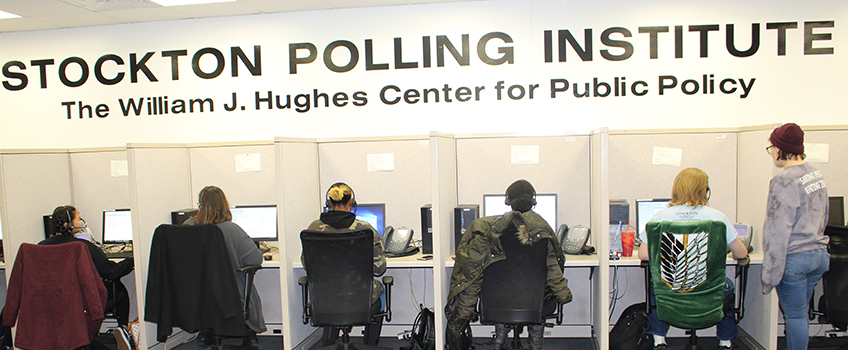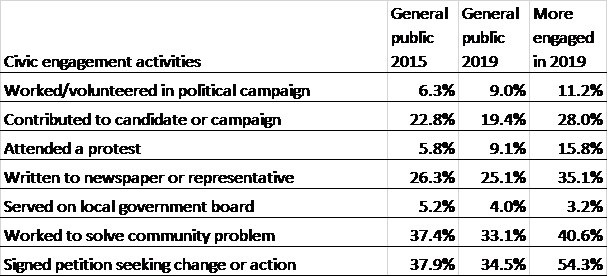Stockton Poll: N.J. Residents More Politically Engaged

Galloway, N.J. - Nearly one-third of New Jersey adults report being more civically engaged today than they were before Donald Trump was elected president, according to a Stockton University Poll released today.
However, when compared with results of a 2015 Stockton poll, the overall percentage of respondents participating in specific civic activities was statistically the same as four years ago.
Results of the 2019 poll by the Stockton Polling Institute show that more than half (57 percent) of the 852 poll respondents said there was no difference in their engagement level between 2015 and 2019. Ten percent reported being less civically active in 2019 than they were four years ago.
Among the 32 percent who reported being more engaged today, women and those identifying as Democrats were the most active.
One in four (24 percent) respondents who are more active today cited opposition to Trump and the Republican Party as motivating factors, while 5 percent were motivated by support of Trump and the GOP. Another one in four (26 percent) cited unhappiness with the state of politics or a sense of civic duty in response to the open-ended question. Five percent of those more engaged today said they feel that democracy or the rule of law is being threatened.
The Stockton Poll asked all respondents whether they had participated in specific civic activities other than voting in the past 12 months. Those results were compared to results for identical questions asked in 2015. Even though one-third had reported being more civically engaged today, the overall percentages participating in specific civic activities was statistically the same as four years ago.
Similar percentages of people in both years volunteered in a campaign, made a campaign contribution, attended a protest, wrote to a newspaper or elected official, served on a local government board, worked on a community problem or signed a petition.
“Many people may feel more engaged in these volatile times even if they are not participating in certain civic practices. Some may relate engagement specifically to voting,” said John Froonjian, Ed.D., interim executive director of the Hughes Center. He noted that voter turnout of more than 55 percent in 2018 was the highest for a midterm election in New Jersey in years.
The Stockton Polling Institute of the William J. Hughes Center for Public Policy at Stockton University interviewed 852 adult residents of New Jersey in this poll. Live interviewers called landline and cell telephones Feb. 21-26 and March 1-5, 2019. The poll’s margin of error is +/- 3.4 percentage points. The poll results were compared to data from 746 respondents in a March 2015 statewide New Jersey poll. The 2015 data had an MOE of +/- 3.6 points.
Respondents who said they are more engaged today than before Trump was elected president were significantly more likely to have participated in the polled civic engagement activities than the general population, both currently and in 2015.

Among those reporting more civic engagement today than in 2015, Democrats had higher participation levels than Republicans or independents. For example: 15 percent of Democrats reported volunteering for a campaign, compared to 6 percent of Republicans and 7 percent of independents; 30 percent of Democrats had made political contributions versus 23 percent of Republicans and 13 percent of independents; and 18 percent of Democrats had attended a rally or protest versus 5 percent among the GOP and 5 percent of independents.
While the results between men and women were somewhat more balanced, higher percentages of women than men reported being more engaged today and having attended a rally, written to a newspaper or elected official or signing a petition. Men and women were statistically similar in terms of volunteering for a campaign, making political contributions or working on local issues.
“These results appear to back up reports of voter enthusiasm among progressives, Democrats and women,” Froonjian said.
For full poll results, go to Poll Results.
About the Hughes Center
The William J. Hughes Center for Public Policy (www.stockton.edu/hughescenter) at Stockton University serves as a catalyst for research, analysis and innovative policy solutions on the economic, social and cultural issues facing New Jersey, and promotes the civic life of New Jersey through engagement, education and research. The center is named for William J. Hughes, whose distinguished career includes service in the U.S. House of Representatives, Ambassador to Panama and as a Distinguished Visiting Professor at Stockton. The Hughes Center can be found on YouTube, and can be followed on Facebook @StocktonHughesCenter, Twitter @hughescenter and Instagram @ stockton_hughes_center .
Methodology
The poll of New Jersey adults was conducted by the Stockton Polling Institute of the William J. Hughes Center for Public Policy at Stockton University between Feb. 21 and March 5, 2019. Live interviewers called cell phones and landlines from the Stockton campus, with 58 percent of interviews conducted on cell phones and 41 percent on landline phones. A total of 852 respondents screened as adult New Jersey residents were interviewed. Both cell and landline phone numbers came from a random digit dialing (RDD) sample provided by MSG. Data were weighted based on U.S. Census Bureau American Community Survey 5-year data for New Jersey for age, ethnicity, race, education level, sex and region. The poll's margin of error was +/- 3.4 percentage points at a 95 percent confidence level. MOE was higher for subsets. The poll results were compared to data from a 2015 statewide New Jersey poll of 876 respondents. The 2015 data was randomly trimmed in certain age categories to 746 interviews to more closely reflect the demographic makeup of the 2019 results. The 2015 data, with a MOE of +/- 3.6 percentage points, were weighted based on American Community Survey data. Differences between the number of respondents polled and total responses shown in results tables are the result of data weighting. The Stockton Polling Institute is a member of the American Association for Public Opinion Research.





